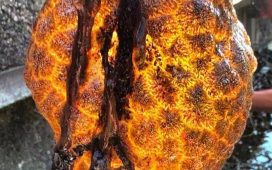Their brazen chip-snatching, swooping and aggressive squawking has earned seagulls a reputation as the scourge of seaside towns, terrorising unsuspecting tourists and enraging residents alike.
And as the marauding birds have ventured inland and established urban colonies, towns have deployed spikes, netting and even birds of prey as deterrents. Now Worcester city councillors appear to be contemplating a new escalation in the battle: bird contraceptives.
Inspired by experimental pigeon-control schemes in Barcelona and Venice, the Labour councillor Jill Desayrah described the approach as “safe sex for seagulls”. “I am concerned that the increasing numbers of gulls are getting out of hand,” she said, according to a report in the Mirror.
Contraceptives have been used with varying degrees of success as a humane approach to containing populations of kangaroos, wild horses, prairie dogs, grey squirrels and rats on the New York subway. But experts are sceptical about the approach being a risk-free quick fix.
First, the perception of gulls as an out of control pest species may not match reality. “While it may appear as though gull species are thriving because of their increasing numbers in some urban areas, they are not faring well elsewhere,” a Royal Society for the Protection of Birds (RSPB) spokesperson said. “People will be surprised to learn that many species of gulls are red- and amber-listed across the UK – the highest levels of conservation concern – including herring gulls and lesser black-backed gulls, which are both declining nationally.”
The annual gull population survey in Blackpole, the area of Worcester that has been floated as a potential location for a pilot, found that 376 pairs were living on retail parks and industrial estates. The majority are lesser black-backed gulls, which is a protected species.
“We would therefore be concerned about any action taken to reduce productivity of the birds without reference to Natural England, the government’s scientific adviser and wildlife regulator,” the RSPB spokesperson said.
There is also the question of efficacy: gulls would need to take the pill daily. But with scraps of discarded food widely available there is no guarantee the council’s contraceptive-laced provisions would be favoured.
“Seagulls can eat many things,” said Cecilia Soldatini, a senior scientist at La Paz University in Mexico, whose research focusses on seabird ecology. Her team uses cheesy fries to lure gulls, but the birds refuse fries that have become soggy in the rain.
“They’re not forced to eat what you’re giving to them,” said Soldatini, who has previously investigated the use of contraceptives in feral pigeons in Venice and found the approach to be of limited utility.
Gulls also have a feeding range of 10-15km (6-9 miles), according to Soldatini, meaning they are not reliant on resources from a tightly defined area. The key, she said, was to eliminate the resources attracting gulls in the first place. “Don’t make food available to them, work on the collection of rubbish. This is the only way.”
Dr Giovanna Massei of the University of York, who is Europe director of the Botstiber Institute for Wildlife Fertility Control, said that “hard scientific evidence” should be sought before any rollout – research she said councils ought to fund if they wished to explore this option. “If you put something out and then there are lots of fish and chips lying around it’s difficult for [the gulls] to get the dose they need.”
She added: “I understand that some councils are desperate to find a solution.”
after newsletter promotion
Kay Haw, the director of UK Squirrel Accord (UKSA), said injectable contraceptives had been used successfully in herd species, such as wild horses in the US. UKSA is investigating oral squirrel contraceptives jointly with the government’s Animal and Plant Health Agency. “There are about 3 million grey squirrels in the UK,” she said. “You can’t catch them all and inject them.”
However, extensive research and fieldwork has had to be carried out over several years before the planned distribution of medicated food can proceed. “It’s not a quick process,” she said.
A key requirement is ensuring the contraceptives only get to the target species – in this case through a special feeding device that red squirrels are unable to operate. Haw said the protein-based contraceptive being used breaks down so quickly that a predator would have to “eat 1,000 squirrels” to be affected.
“People aren’t necessarily as careful as they need to be about this,” she said. “They have issues on the Isle of Wight with red squirrels being poisoned by rat poison.”
Soldatini agreed that non-eaten food could pose an environmental risk. “If it rains, it can go into rivers, or seawater,” she said. “This same pills can affect the populations living there – fish, other birds, sea mammals.”
The squirrel project also has a different motivation: to support the growth of red squirrel populations and the health of woodlands, not simply to remove a species deemed to be a nuisance to humans. “We’re working on an invasive species problem – the [grey squirrels] should never have been here,” Haw said. “That’s a different angle to a native species.”
A Worcester city council spokesperson said: “An annual gull report will be presented to the city council’s environment committee on 5 November. This will provide councillors with an opportunity to consider a gull management programme for 2025.”











